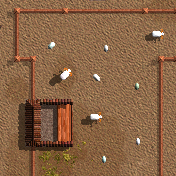Pasture: Difference between revisions
No edit summary |
Scribonius (talk | contribs) m (Fixed bad link) |
||
| Line 1: | Line 1: | ||
[[File:pasture_preview.png|thumb|176px|right|Preview of an [[onx pasture]].]][[File:pasture_anim.gif|left]]'''Pastures''' are closed-off pens designed for holding [[animals]], with the intent of breeding them and harvesting their [[resources]] from them, with [[meat]] being the most common. There are eight animals in the game, though only five of them can be kept in pastures: the [[auroch pasture|auroch]], [[globdien pasture|globdien]], [[entelodont pasture|entelodont]], [[onx pasture|onx]] and [[ | [[File:pasture_preview.png|thumb|176px|right|Preview of an [[onx pasture]].]][[File:pasture_anim.gif|left]]'''Pastures''' are closed-off pens designed for holding [[animals]], with the intent of breeding them and harvesting their [[resources]] from them, with [[meat]] being the most common. There are eight animals in the game, though only five of them can be kept in pastures: the [[auroch pasture|auroch]], [[globdien pasture|globdien]], [[entelodont pasture|entelodont]], [[onx pasture|onx]] and [[Balticrawler Pasture|balticrawler]]. Certain pastures can only be built if the respective animal is naturally found in the matching [[climate]]. For example, globdiens are cold-blooded reptiles, so they prefer warm climates, meaning that settlements in cold or temperate climates will have [[globdien pasture]]s completely unavailable in the building selection GUI. | ||
When pastures are made, a single gate [[component]] must also be installed against a fence, at the cost of 20 [[wood]]. The bigger the pasture, the more [[workforce|workers]] and [[livestock]] it can support. Livestock is a resource like any other, and can be [[storage|stored]] and [[trading|traded]], as well further populat pastures. Over time, pastures will start spawning the respective animal. | When pastures are made, a single gate [[component]] must also be installed against a fence, at the cost of 20 [[wood]]. The bigger the pasture, the more [[workforce|workers]] and [[livestock]] it can support. Livestock is a resource like any other, and can be [[storage|stored]] and [[trading|traded]], as well further populat pastures. Over time, pastures will start spawning the respective animal. | ||
Latest revision as of 21:33, 10 March 2023


Pastures are closed-off pens designed for holding animals, with the intent of breeding them and harvesting their resources from them, with meat being the most common. There are eight animals in the game, though only five of them can be kept in pastures: the auroch, globdien, entelodont, onx and balticrawler. Certain pastures can only be built if the respective animal is naturally found in the matching climate. For example, globdiens are cold-blooded reptiles, so they prefer warm climates, meaning that settlements in cold or temperate climates will have globdien pastures completely unavailable in the building selection GUI.
When pastures are made, a single gate component must also be installed against a fence, at the cost of 20 wood. The bigger the pasture, the more workers and livestock it can support. Livestock is a resource like any other, and can be stored and traded, as well further populat pastures. Over time, pastures will start spawning the respective animal.




